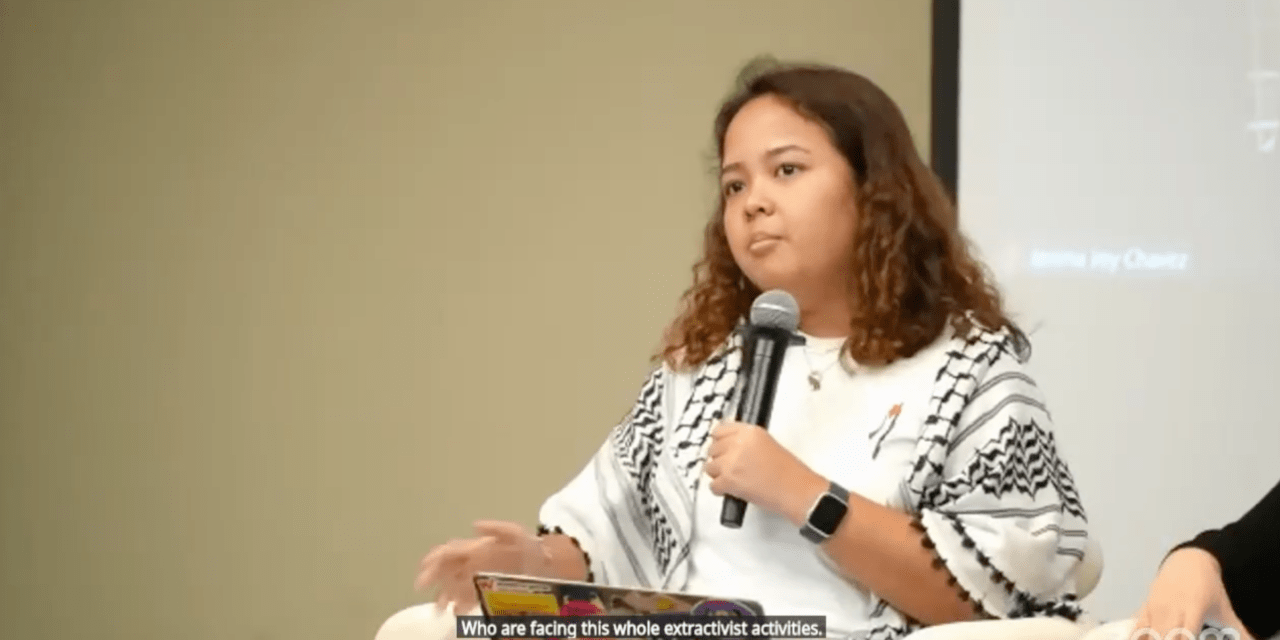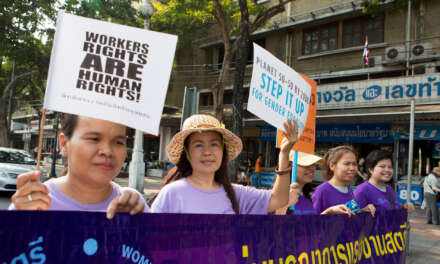“We are using colonial feminism to analyze corporate hegemony in trade, climate, and political economy,” she began. “And we are also talking about the politics of care.”
Salsabila was quick to clarify that the work she presented was not hers alone. “This is not based on the work of an individual,” she said, “but built upon the thoughts, knowledge, and experience of many people.” She spoke as part of Puanifesto, a feminist collective grounded in a decolonial lens and part of both the Indonesian Civil Society Coalition for Economic Justice and the Gender and Trade Coalition. These networks analyze how corporate and state power intersect in policies affecting land, livelihoods, and labor—particularly for women.
At the heart of her presentation was a clear message: global trade and financial regimes—often led by institutions like the World Trade Organization (WTO), International Monetary Fund (IMF), and World Bank—continue to reinvent themselves in ways that maintain power imbalances. They adopt the language of gender equality, youth inclusion, and climate concern, but their structural goals remain the same. “They sugarcoat everything with gender language,” she said. “But it’s really about putting the already rich woman into the global market… and contributing to the poverty of the majority.”
She highlighted how the WTO’s Joint Declaration on Trade and Women’s Economic Empowerment, launched in 2017, formed an informal working group to integrate gender into trade policy, but without confronting the underlying extractivist economic model. The WTO even awards an annual International Prize on Gender Equality in Trade in categories like “female entrepreneurs” and “youth empowerment,” promoting policies they describe as gender transformative. But for feminists like Salsabila, these efforts are designed to distract from trade’s real consequences.
“It’s ironic how they try to frame free trade as an opportunity for women,” she said. “We have to be very careful and have a nuanced perspective, so we don’t fall into the trap of these sugarcoating efforts.” She reminded the audience that trade is not just economic—it’s geopolitical. “Trade today is also about showing the world who your friends are, and who you are not.”
The impacts of free trade, she emphasized, are not abstract. They are lived every day by women in places like Morowali, Central Sulawesi, where land once cultivated by transmigrant farmers has been taken over by nickel mining. “Now they’re informal workers, vendors, or operating machines in nickel processing zones. And some people call that empowerment. But machines for what? Machines to destroy the environment and impoverish people.”
Conditions in Morowali highlight the violence of extractivist development: uncovered nickel ore stored near homes, coal piles next to residential areas, and toxic exposure without protection. “There’s no ESG (ESG – Environmental, social, and governance, is shorthand for an investing principle that prioritizes environmental issues, social issues, and corporate governance) in Central Sulawesi,” she said. “There is no responsibility (i.e. responsible mining) at all. It’s not just about poverty anymore—it’s a crisis of health, environmental destruction, and sexual violence too.”
And yet, in the face of this multi-layered crisis, women are not only surviving—they are organizing. From the Chipko movement in India to the women of Kendeng in Indonesia and the Zapatista compañeras in Mexico, women are at the forefront of resistance against capitalism, extractivism, and colonialism. Their resistance is not only through protests or blockades but also through building alternatives.
One such alternative is Feminist Economic Solidarity (FES), a model that has emerged from the ground up in Indonesia, where women in multiple regions are responding to threats posed by both state and corporate actors. From large-scale plantations in South Sumatra to massive infrastructure projects in Makassar, and climate schemes in Poso and Jakarta, women have found themselves on the frontlines of displacement and dispossession. Even though Indonesia formally adopted a people-centered economic approach after the fall of dictatorship in 1998, Salsabila noted that in practice, “resources are still managed by a few elites, ignoring people’s rights and welfare.”
Feminist economic solidarity, she explained, is about reclaiming the economy as something rooted in community, care, and sustainability—not profit. “It’s not just about resisting,” she said. “It’s about building.” Women organize collectively, seeing their unity as the foundational capital. They draw on local knowledge and use nearby resources rather than depending on products that require long, unsustainable supply chains. They map their allies and supporters, identify creative ways to access financing—like village funds—and build alternative markets through community networks. “The aim is not to compete, but to trade based on mutual needs.”
This kind of economy may not make headlines, but it is visionary and long-term. It redefines what counts as “economic activity” and places care—both collective and ecological—at the center. “Feminist responses are intersectional, community-centric, and care-centered,” Salsabila said. “And they are rooted in the context of each place. There is no single solution.”
Her closing reflections were a call to action. “Let’s decolonize our minds. Let’s learn and unlearn the things around us. Always ask—who benefits from the current system?” She emphasized the importance of documenting oral histories, resisting narratives that seek to ‘civilize’ communities, and creating safe spaces where care and solidarity are political tools. “Let’s break down barriers and build international solidarity. Let’s build intergenerational exchanges—because while the youth are not guilty of today’s policies, they will bear the consequences of tomorrow.”
Finally, she reminded the audience that care—so often dismissed in dominant economic frameworks—is itself a site of resistance. “Let’s rethink the politics of care. That includes care economy models that prioritize people and planet, and collective care that sustains our movements. Self-care and collective care are not just about survival. They are how we thrive.”
The final words of her speech were borrowed from Black feminist writer Audre Lorde:
“Caring for myself is not self-indulgence, it is self-preservation—and that is an act of political warfare.”









